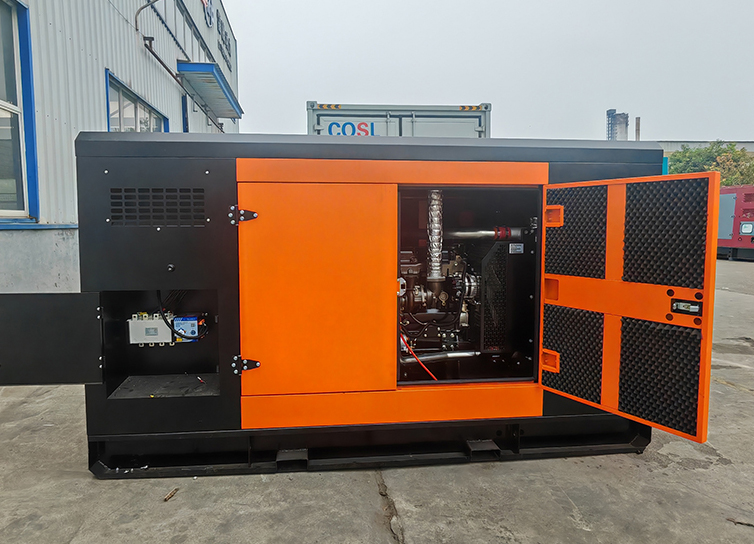Hybrid Power Systems: Combining Diesel and Solar for a Sustainable Energy Future
Release time:2025-10-31 Click:10
In a world increasingly dependent on clean and reliable energy, hybrid power systems — combining diesel and solar technology — are rapidly emerging as a new standard for sustainable power generation. From desert camps in the Middle East to remote agricultural regions in Europe and Africa, this innovative combination achieves a perfect balance between reliability, efficiency, and environmental responsibility.
Traditional diesel generators have long been the backbone of off-grid energy solutions, especially in construction, mining, and emergency power sectors. However, growing concerns over carbon emissions and fuel dependency have triggered a global shift toward renewable energy integration.
Hybrid power systems blend the steady reliability of diesel engines with the clean, renewable potential of solar energy. This combination not only reduces fuel consumption but also ensures uninterrupted power in environments where sunlight alone may not be sufficient, such as during nighttime or cloudy conditions.
The principle of a hybrid system is simple yet highly effective. During daylight, solar panels capture sunlight and convert it into electricity to power loads and charge batteries. When solar energy is insufficient or load demand spikes, the diesel generator automatically starts to fill the energy gap, ensuring continuous power supply.
This synchronization is often managed by digital controllers or AI-based energy management systems, optimizing power usage and minimizing generator runtime, thereby reducing fuel costs and extending equipment life.
Q: Can hybrid systems completely replace diesel generators?
A: Not entirely, but they can significantly reduce diesel consumption. In most cases, hybrid systems cut fuel usage by 40% to 80%, depending on solar conditions.

1. Fuel Efficiency and Cost Savings: Solar energy powers operations during the day, dramatically reducing diesel usage and operating expenses.
2. Lower Emissions: Reduced fuel use means fewer greenhouse gas emissions, supporting global sustainability goals.
3. Energy Security: Diesel ensures backup during non-sunny periods, guaranteeing reliability for critical operations like hospitals and data centers.
4. Extended Equipment Lifespan: Less runtime means reduced wear and longer maintenance intervals.
5. Scalability and Flexibility: Hybrid systems can be scaled for small homes or large industrial facilities.
Hybrid systems are being deployed across industries and continents:
- Middle East: In desert oil camps, solar panels endure high heat while diesel ensures 24/7 power.
- Europe: Used in remote farms to lower energy costs and carbon footprints.
- Africa: Provides reliable electricity for off-grid villages, boosting education and local economies.
- Asia: Manufacturing zones and mobile housing projects rely on hybrid systems for energy independence.
With advances in battery storage, smart energy management, and predictive maintenance, hybrid systems are entering a new era. Lithium batteries are now more affordable and efficient, storing excess solar power for night use.
AI-based controllers analyze load demand, weather forecasts, and fuel status to dynamically balance power sources. Meanwhile, IoT sensors allow real-time remote monitoring to ensure optimal system performance.
Q: How do modern hybrid systems prioritize energy sources?
A: Intelligent control units assess load demand, solar input, and fuel levels, automatically switching between solar, battery, and diesel for maximum efficiency.
Although hybrid systems require higher upfront investment, their long-term savings are substantial. Lower fuel use, reduced maintenance, and longer equipment life yield faster ROI. Additionally, government subsidies and green tax incentives across Europe and the Middle East further enhance financial feasibility.
Every liter of diesel saved contributes to reducing CO₂ emissions. For organizations striving to meet sustainability or ESG goals, hybrid systems are a strong ally. They also cut noise pollution, making them ideal for residential or eco-sensitive zones.
While hybrid systems offer numerous advantages, they still face challenges such as initial investment, battery disposal, and technical training. However, as renewable technologies become more affordable, these barriers are rapidly diminishing.
Experts predict that by 2030, diesel-solar hybrid systems will dominate the off-grid power market, particularly in developing regions.
Q: Can hybrid systems power large-scale industries?
A: Absolutely. Modern hybrid plants can be customized for megawatt-scale operations, making them suitable for factories, mines, and infrastructure projects.
The Middle East, rich in solar resources yet reliant on diesel, is ideal for hybrid adoption. Projects in Saudi Arabia, UAE, and Oman have proven that hybrid systems can deliver stable and efficient power. Meanwhile, Europe’s strict carbon regulations and energy transition goals are accelerating hybrid deployments.
Hybrid power systems represent the future of distributed energy — merging diesel reliability with solar sustainability. This synergy ensures that governments, businesses, and communities can achieve both energy independence and environmental responsibility.
With continuous innovation, hybrid systems will soon become an essential component of global power infrastructure, driving a greener, more resilient energy future.
Hot products
+86 15244567972
Contacts:Jack
